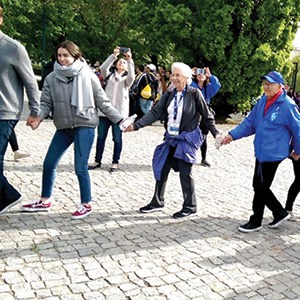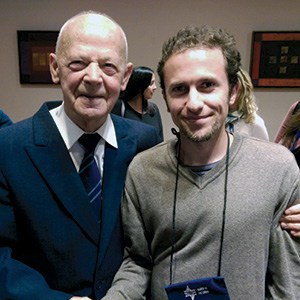Witold Lisowski, recognized as a Righteous Among the Nations, and Simon Fink.
This trip will leave you with more questions than answers.
That’s what our guide, Avi Marcovitz, told our group as we gathered in Warsaw’s airport. By we, I mean the 23 young adults from across the U.S. and two from South Africa, who had come to Poland to participate in the International March of the Living—an annual education program that brings groups from all over the world “to study the history of the Holocaust and examine the roots of prejudice, intolerance and hatred.” Temples, JCCs, and schools organize groups, but ours came together as strangers, The Young Adult Delegation. Some of us had grandparent survivors. Some were observant, some not. All of us, though, had the same question as we got on the bus—how will we react when we enter the concentration camp?
I remember a childhood trip to the Grand Canyon. Standing at the edge, my parents gasped in awe. I didn’t. I asked, how come? How come my younger siblings and I didn’t have that visceral wonder (I probably didn’t use the word visceral). It wasn’t exactly surprising. It looked just like it does on Google Images.

Singing and dancing with survivors, Warsaw Memorial.
Would that be the first reaction I would have to Majdanek, a 667-acre camp that killed approximately 360,000, including 78,000 Jews? Or, how I’d respond to Auschwitz and its more than 1,000,000 victims?
Well, yes. I didn’t cry. For the same reason that those numbers fail to evoke tears, it is unimaginable. Even surrounded by barbed wire, standing in the shadow of the watchtowers, smelling the wood, these sensations were untethered to anything I knew. It was like being on another planet.
Then, slowly we came down to earth. As our guide, Avi, told us about the business of the Nazis, the bureaucracy, the city planning, the bids for which company would build and maintain the ovens. As we watched our group members, slowly becoming friends, comb through the giant book of names in Auschwitz finding their own last names inside. As we sang Oseh Shalom and danced with survivors in the Warsaw ghetto, bringing them to tears to see young Jews celebrating hope. As all of this happened, the impossibility of death connected with life. It became real.
Strangely, I think I can sum it all up in one word: affirming. It’s strange because I did leave with more questions than answers. Our final night we sat together bonded by an intense shared whirlwind and asked what do we do now? If two-thirds of millennials don’t know what Auschwitz is, how should we teach them? Should we teach them? As witnesses now ourselves, what do we do with what we have seen?
This trip affirmed the need to pursue these questions. I hope I’ve sparked some here.
If you have any interest, I encourage going while there are still survivors and righteous gentiles alive to experience it with. If you have questions regarding the March next April, contact their office at motl@motlmail.org.
Simon Fink

